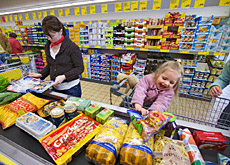Government acts against high prices

The government has decided to help lower high prices in Switzerland by opening up the market to more European Union products.
It wants to adopt the Cassis-de-Dijon principle, which states that a product legally manufactured in one EU state may circulate freely in another.
Switzerland is not a member of the EU and comparisons with its neighbours which are members have shown that Swiss prices are generally much higher.
A recent survey put the price differences between Swiss and German supermarkets at as much as 70 per cent, with an average price difference of between 20 and 30 per cent.
Experts say Switzerland’s sluggish domestic market, a lack of competition and tough import rules all combine to push prices up.
Barriers to trade
In a statement on Wednesday, the government said adoption of the Cassis-de-Dijon principle would aim to combat this by helping to reduce the technical barriers to trade in the country.
“[The government] … approved the idea of the Cassis-de-Dijon principle, which applies to the EU member states, being also applied to the goods trade between Switzerland and the EU,” said the statement.
This would effectively allow a product permitted in the EU to be sold in Switzerland and would mainly apply to construction industry products, certain foodstuffs and bicycles.
The move would make competition more dynamic and reduce costs for consumers and firms, said the government.
The government wants the proposal, still in its early stages, to be transmitted to parliament which will be asked to amend the law on the barriers to trade to include the Cassis principle.
“Half-hearted”
The EU Internal Market commissioner, Charlie McCreey, welcomed the move, calling it a “win-win situation” for both the EU and Switzerland.
But the Swiss Consumers Association, which has long been fighting for lower prices, called the move “half-hearted” and called on the government to act more quickly.
The EU had already shown that removing barriers to trade and increasing competition was compatible with a better level of consumer protection, said the association.
Under tough Swiss rules many EU products do not make their way onto Swiss dining tables. One such example is cream produced in Germany which is not allowed in Switzerland because it was labelled Sahne and not Rahm, the approved term in Switzerland. In other cases, packaging requires modification before crossing the Swiss border.
The association said it was time to do away with such rules, calling the cream example “ridiculous” and leading to an unnecessary rise in costs.
Reservations
For its part, the Consumers’ Association for French-speaking Switzerland told swissinfo that it was mainly in favour of the move, but had reservations.
“We don’t know yet if the products from the new [mostly eastern European] EU members that will come here will be up to our standards,” said the association’s Nadja Thiongane.
Meanwhile, the Swiss Business Federation said there could be problems with the exceptions to the cassis principle, such as in high-fat foods and the declaration of radiation from mobile phones.
The Cassis-de-Dijon Principle came about in 1979 after a case was brought by an importer who was not allowed to sell Cassis-de-Dijon in Germany because it was below the alcoholic strength required under German law.
The principle was subsequently applied to other products, such as beer (prevented from entering Germany if produced with ingredients other than malt, hops, yeast and water) or pasta (banned by Italy if it contained common – as opposed to durum – wheat).
swissinfo with agencies
The Cassis-de-Dijon Principle states that a product legally manufactured and marketed in one European Union member state may circulate freely in the other states.
Free trade can be impeded only if it can be demonstrated that a product represents a danger to public health.
The principle does not apply between Switzerland and the EU.

In compliance with the JTI standards
More: SWI swissinfo.ch certified by the Journalism Trust Initiative










You can find an overview of ongoing debates with our journalists here . Please join us!
If you want to start a conversation about a topic raised in this article or want to report factual errors, email us at english@swissinfo.ch.